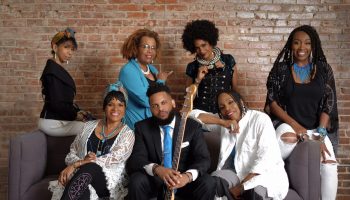
Cody Englander
Staff Writer
At 8:15 p.m. tonight in the Amphitheater, Afro-Andean Funk takes the stage to perform their blend of traditional music with funk.
The band was formed in 2021 by Matt Geraghty and Araceli Poma. With two albums out, the band will be previewing new music tonight. Their first album, The Sacred Leaf garnered a Latin Grammy nomination.
Geraghty is a New York producer, bassist and composer. He’s known for musical collaborations and award-nominated music documentaries to spotlight unknown artists throughout America.
Poma is a two-time Latin Grammy–nominated vocalist, producer, and cultural advocate from Peru. She uses her voice to speak for Indigenous and marginalized communities.
“It’s music that bridges the past and the future,” said Poma. “We blend Afro-Peruvian and Andean traditions with funk, electronica and global grooves. You’ll hear cajón and charango next to synths and bass — Quechua lyrics next to electric guitar. It’s ancestral and modern, ceremonial and danceable.”
Geraghty described the band’s music as a mix of Herbie Hancock and Radiohead. But what’s more is that the band has found themselves drawn to inspiration outside sheets of music.
“We’ve also been deeply influenced by the stories behind the music — the struggle, the resistance, the healing,” said Poma. “That’s what gives the sound depth.”
The sound and band originated when Geraghty was in Lima, Peru, while both he and Poma were working on a project.
“I was producing a documentary and album called The Warrior Women of Afro-Peruvian Music,” Geraghty said. “That’s how Araceli and I met. We started writing together, and we realized we had a shared vision — to honor tradition while pushing musical boundaries.”
Poma grew up in Peru, listening to traditional Afro-Peruvian and Andean music.
“Festejo, landó, huayno — those sounds live inside me,” she said. “But I also loved soul, rock and pop. This band lets me bring all of that together.”
This collaboration has grown from one project to albums, documentaries and live performances. Due to the clash of genres, many themes of their music involve community, which is why live performances are so important to the band.
“There’s no separation between the audience and us — it’s an exchange,” Geraghty said. “Our music is about migration, identity, memory. Those are things everyone feels in some way. Live shows make that connection visceral.”
Songs can take on a new life with the audience, which is part of the reason Geraghty’s favorite song to perform live is “Libre Como el Agua.”
“It was written by our good friend Javier Lazo — a beautiful, highly danceable festejo that always connects with people,” said Geraghty. “Over time, it’s evolved into our own arrangement, and it’s become an anthem of freedom and flow. “
With musical inspirations from Peru, Poma noted her favorite song to perform, “Quechua Funk.”
“It’s about reclaiming a language — Quechua —that my grandmother was told not to speak,” she said. “When I sing in Quechua, I feel like I’m making her visible again.”
Their band name both identifies their genre and honors their heritage.
“It’s a name that honors where we come from,” said Poma. “ ‘Afro’ for the Black roots of Peru, ‘Andean’ for my heritage in the mountains, and ‘Funk’ for the groove that unites us.”
Currently the band is working on their third album, Todo Migra, set to release later this year.
“You’ll hear a lot of that music at Chautauqua,” Geraghty said. “We’re also exploring multimedia collaborations that bring Indigenous storytelling and digital visuals together — new ways to experience musicas ritual and narrative.”
This October, the band will perform at the China Shanghai International Arts Festival. “We’ll be presenting ‘Ukupacha,’ a new show inspired by Andean cosmology,” Poma said. “We’re proud to represent the United States at Asia’s leading music and arts festival this year.”
To Geraghty, the influence of Peruvian music brings people together.
“It’s powerful to see people from totally different backgrounds dancing together to rhythms from Peru,” he said. “That’s how culture evolves — when we share it.”




